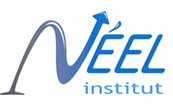- Home
- Institut Néel
- Research teams
- Technical Groups & Services
- Work at the Institut
- Partnerships
Link: https://univ-grenoble-alpes-fr.zoom.us/j/91671465175?pwd=eUR5c1NWVW1sZEMyNXplK01RNytCUT09
Meeting ID: 916 7146 5175
Passcode: 396916
Seminar room F418, Edwin Bertaut : Number of participants limited to 16
The presentation will be in English.
Optical refrigeration in solids or laser cooling in solids is a breakthrough technology, reaching cryogenic temperatures (below 123 K) by the illumination of rare-earths ions doped crystals Yb:YLF with an infrared laser at the adapted wavelength. The excitation of such a crystal near the gap wavelengths between fundamental and excited electronic states allows to favorise the Anti-Stokes fluorescence emission, phenomenon by which the crystal re-emits more light than it has absorbed, hence cooling it down.
This thesis inserts in the frame of a French collaboration between Air Liquide Advanced Technologies (Sassenage), European leader of space cryogenics and Institut Néel, CNRS (Grenoble). The first goal of my thesis was to demonstrate the operation of a Laser Cryocooler prototype aimed at space applications. In three years, we successfully designed, developed and tested a laser cooler laboratory prototype capable of reaching cryogenics temperatures, thus advancing to TRL 3 (laboratory demonstration) technological maturity for the first time in Europe.
The second goal of my thesis was to study the feasibility and suitability of Laser Cryocoolers for future Earth observation satellites. Based on the power architecture of small low earth orbit infrared observation satellites, we compared the balance of a solution with a Laser Cryocooler versus a Pulse-Tube cooler based solution in terms of size, weight and power at the level of the whole satellite. We show that a Laser Cryocooler is a compact system which allows for internal volume and mass savings in the payload part of a satellite, on top of its other advantages.
This work opens the way to a new generation of cryocoolers for future space applications: Laser Cryocoolers are miniaturized, vibration-less and features reduced thermal losses due to the optical and contact-free nature of the technology.
Thesis supervisor: Gilles Nogues (Institut Néel, CNRS)
Co-director: Arnaud Gardelein (Air Liquide Advanced Technologies)
